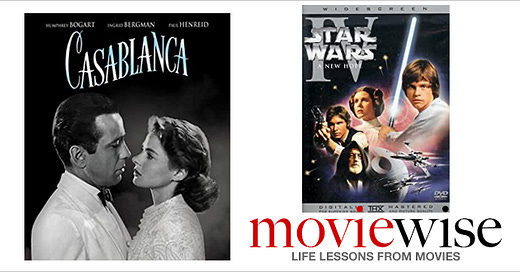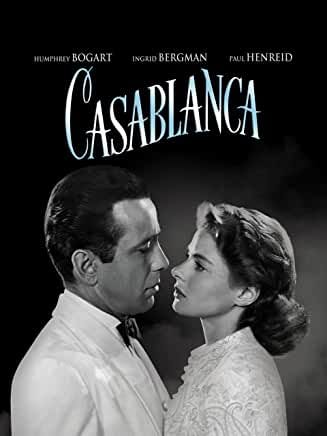On Being Noble In Drama, Sci-Fi & Comedy Films
Love & Sacrifice in Casablanca (1942), Star Wars (1977), and Spaceballs (1987)
Image by L.E. Wilson from RedBubble
Maybe it’s not really that surprising that past movies influence future ones. It’s pretty obvious that film directors, like all of us, are influenced by the larger media environment. This is even more apparent when individual movies enter the zeitgeist and become part of the culture. After all, how could these classics not have some kind of impact on filmmakers?
But what may be a more interesting discovery is the idea that past movies may not only shape story, character, cinematography, but also the core message of newer films. Such is the case with the romantic drama Casablanca (1942), the sci-fi epic Star Wars: Episode IV: A New Hope (1977), and the parody Spaceballs (1987). These are three movies with essentially one shared Life Lesson.
Casablanca (1942) is a drama directed by Michael Curtiz, based on the play, Everybody Comes to Rick’s, about a married couple, Ilsa Lund (Ingrid Bergman) and Victor Laszlo (Paul Henreid), who ask American businessman Rick Blaine (Humphrey Bogart) for help in escaping the Nazis in Morocco.
Life Lesson: Sometimes a situation calls for you to be the noble hero.
🍿Movie Scene Link (movie quote)
Star Wars: Episode IV: A New Hope (1977) is a fantasy written and directed by George Lucas about a scrappy group of rebels, including Luke Skywalker (Mark Hamill), Princess Leia (Carrie Fisher), Han Solo (Harrison Ford), and Obi-Wan Kenobi (Alec Guinness), who team up to destroy the Death Star, a weapon powerful enough to obliterate a planet.
Life Lesson: Fight for something greater than yourself.
🍿Movie Scene Link (movie quote)
Spaceballs (1987) is a comedy co-written and directed by Mel Brooks about a father, King Roland (Dick Van Patten), who hires a mercenary, Lone Starr (Bill Pullman), and his sidekick, Barf (John Candy), to rescue his daughter, Princess Vespa (Daphne Zuniga), from an invading force led by Dark Helmet (Rick Moranis).
Life Lesson: Doing good is its own reward.
🍿Movie Scene Link (movie quote)
For a full analysis of how Star Wars: Episode IV: A New Hope (1977) is in many ways a re-imagination of the World War II drama Casablanca (1942), please see Bryan Young’s article “The Cinema Behind Star Wars: Casablanca” and Michael Heilemann’s article “The Origins Of Star Wars.” In sum, the heroes in these two films, Rick Blaine (Humphrey Bogart) and Han Solo (Harrison Ford) appear to be cynical scoundrels who only look out for themselves, only to reveal in the end that they are more noble, more willing to sacrifice themselves for a greater cause, for love, than anyone else.
In addition to the Rick Blaine and Han Solo parallels discussed in the previous articles, Ilsa Lund (Ingrid Bergman) and Princess Leia (Carrie Fisher) share several similarities, too. In terms of imagery and characterization, for example, the female lead in Casablanca, Ilsa often wears white and is a fighter handy with a gun as is the female lead in Star Wars, Princess Leia. Both sport a white veil in iconic scenes, and both are the love interests of the heroes.
And of course, Spaceballs (1987) is a parody, mimicking for great gags as much of the visual imagery and characterization of Star Wars as possible, including Princess Leia’s white dress and her hairstyle, as well as Darth Vader’s dark helmet look, the Stormtroopers’ white uniform, a female version of the iconic humanoid protocol droid C-3PO, called Dot Matrix, voiced by comedian Joan Rivers, and the anti-hero mercenary modeled after Han Solo, aptly named Lone Starr (Bill Pullman), who has many of the same rogue personality traits.
But what really unites these three films is a fidelity to the idea that behaving in an honorable, virtuous, noble manner results in a greater good. All the main characters, Rick Blaine (Humphrey Bogart), Han Solo (Harrison Ford), and Lone Starr (Bill Pullman) put themselves in harm’s way and sacrifice something in order to help others: Rick Blaine by giving up his relationship with the woman he loves, Han Solo by risking his life to fight in a losing battle, and Lone Starr by not accepting the reward money he was promised for rescuing the princess. And yet, none of these acts lead to sad endings. On the contrary, all these movies end on upbeat notes, with the characters being recognized for their sacrifices, and with essentially the same message from Casablanca, “I think this is the beginning of a beautiful friendship.”
In other words, what all three movies wind up saying is that you’re a better person for acting nobly, for you gain greater rewards as a result, primarily the knowledge of your integrity and capabilities, including your willingness to sacrifice yourself to help someone you love. This is a level of personal satisfaction and self-assurance that is long lasting and which no amount of wealth or creature comforts can bestow.
Now that is a valuable insight about life and living that you can take to the bank.
Visit the moviewise catalogue—a searchable database of one sentence movie summaries, movie quotes, and movie wisdom—for movie recommendations.
Also visit the moviewise store. Get a t-shirt, bag, or pillow with your favorite #LifeLesson from a movie. Reply to this or leave a comment below to make a request.











